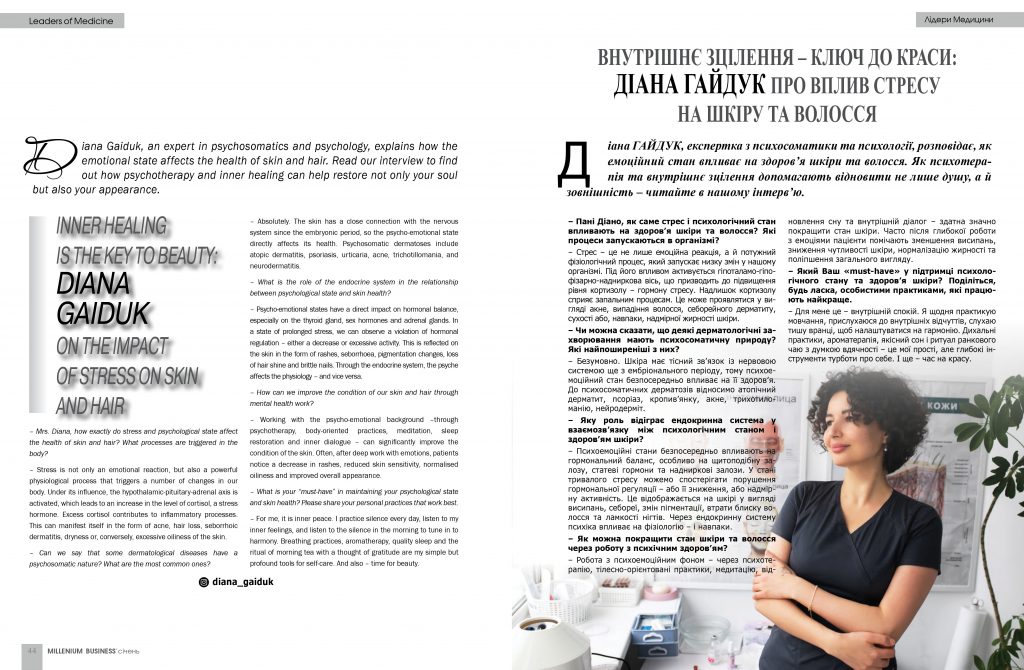Діана ГАЙДУК, експертка з психосоматики та психології, розповідає, як емоційний стан впливає на здоров’я шкіри та волосся. Як психотерапія та внутрішнє зцілення допомагають відновити не лише душу, а й зовнішність – читайте в нашому інтерв’ю.

– Пані Діано, як саме стрес і психологічний стан впливають на здоров’я шкіри та волосся? Які процеси запускаються в організмі?
– Стрес – це не лише емоційна реакція, а й потужний фізіологічний процес, який запускає низку змін у нашому організмі. Під його впливом активується гіпоталамо-гіпофізарно-надниркова вісь, що призводить до підвищення рівня кортизолу – гормону стресу. Надлишок кортизолу сприяє запальним процесам. Це може проявлятися у вигляді акне, випадіння волосся, себорейного дерматиту, сухості або, навпаки, надмірної жирності шкіри.
– Чи можна сказати, що деякі дерматологічні захворювання мають психосоматичну природу? Які найпоширеніші з них?
– Безумовно. Шкіра має тісний зв’язок із нервовою системою ще з ембріонального періоду, тому психоемоційний стан безпосередньо впливає на її здоров’я. До психосоматичних дерматозів відносимо атопічний дерматит, псоріаз, кропив’янку, акне, трихотиломанію, нейродерміт.
– Яку роль відіграє ендокринна система у взаємозв’язку між психологічним станом і здоров’ям шкіри?
– Психоемоційні стани безпосередньо впливають на гормональний баланс, особливо на щитоподібну залозу, статеві гормони та надниркові залози. У стані тривалого стресу можемо спостерігати порушення гормональної регуляції – або її зниження, або надмірну активність. Це відображається на шкірі у вигляді висипань, себореї, змін пігментації, втрати блиску волосся та ламкості нігтів. Через ендокринну систему психіка впливає на фізіологію – і навпаки.
– Як можна покращити стан шкіри та волосся через роботу з психічним здоров’ям?
– Робота з психоемоційним фоном – через психотерапію, тілесно-орієнтовані практики, медитацію, відновлення сну та внутрішній діалог – здатна значно покращити стан шкіри. Часто після глибокої роботи з емоціями пацієнти помічають зменшення висипань, зниження чутливості шкіри, нормалізацію жирності та поліпшення загального вигляду.
– Який Ваш «must-have» у підтримці психологічного стану та здоров’я шкіри? Поділіться, будь ласка, особистими практиками, які працюють найкраще.
– Для мене це – внутрішній спокій. Я щодня практикую мовчання, прислухаюся до внутрішніх відчуттів, слухаю тишу вранці, щоб налаштуватися на гармонію. Дихальні практики, ароматерапія, якісний сон і ритуал ранкового чаю з думкою вдячності – це мої прості, але глибокі інструменти турботи про себе. І ще – час на красу.
INNER HEALING IS THE KEY TO BEAUTY: DIANA GAIDUK ON THE IMPACT OF STRESS ON SKIN AND HAIR
Diana Gaiduk, an expert in psychosomatics and psychology, explains how the emotional state affects the health of skin and hair. Read our interview to find out how psychotherapy and inner healing can help restore not only your soul but also your appearance.
– Mrs. Diana, how exactly do stress and psychological state affect the health of skin and hair? What processes are triggered in the body?
– Stress is not only an emotional reaction, but also a powerful physiological process that triggers a number of changes in our body. Under its influence, the hypothalamic-pituitary-adrenal axis is activated, which leads to an increase in the level of cortisol, a stress hormone. Excess cortisol contributes to inflammatory processes. This can manifest itself in the form of acne, hair loss, seborrhoic dermatitis, dryness or, conversely, excessive oiliness of the skin.
– Can we say that some dermatological diseases have a psychosomatic nature? What are the most common ones?
– Absolutely. The skin has a close connection with the nervous system since the embryonic period, so the psycho-emotional state directly affects its health. Psychosomatic dermatoses include atopic dermatitis, psoriasis, urticaria, acne, trichotillomania, and neurodermatitis.
– What is the role of the endocrine system in the relationship between psychological state and skin health?
– Psycho-emotional states have a direct impact on hormonal balance, especially on the thyroid gland, sex hormones and adrenal glands. In a state of prolonged stress, we can observe a violation of hormonal regulation – either a decrease or excessive activity. This is reflected on the skin in the form of rashes, seborrhoea, pigmentation changes, loss of hair shine and brittle nails. Through the endocrine system, the psyche affects the physiology – and vice versa.
– How can we improve the condition of our skin and hair through mental health work?
– Working with the psycho-emotional background –through psychotherapy, body-oriented practices, meditation, sleep restoration and inner dialogue – can significantly improve the condition of the skin. Often, after deep work with emotions, patients notice a decrease in rashes, reduced skin sensitivity, normalised oiliness and improved overall appearance.
– What is your “must-have” in maintaining your psychological state and skin health? Please share your personal practices that work best.
– For me, it is inner peace. I practice silence every day, listen to my inner feelings, and listen to the silence in the morning to tune in to harmony. Breathing practices, aromatherapy, quality sleep and the ritual of morning tea with a thought of gratitude are my simple but profound tools for self-care. And also – time for beauty.
